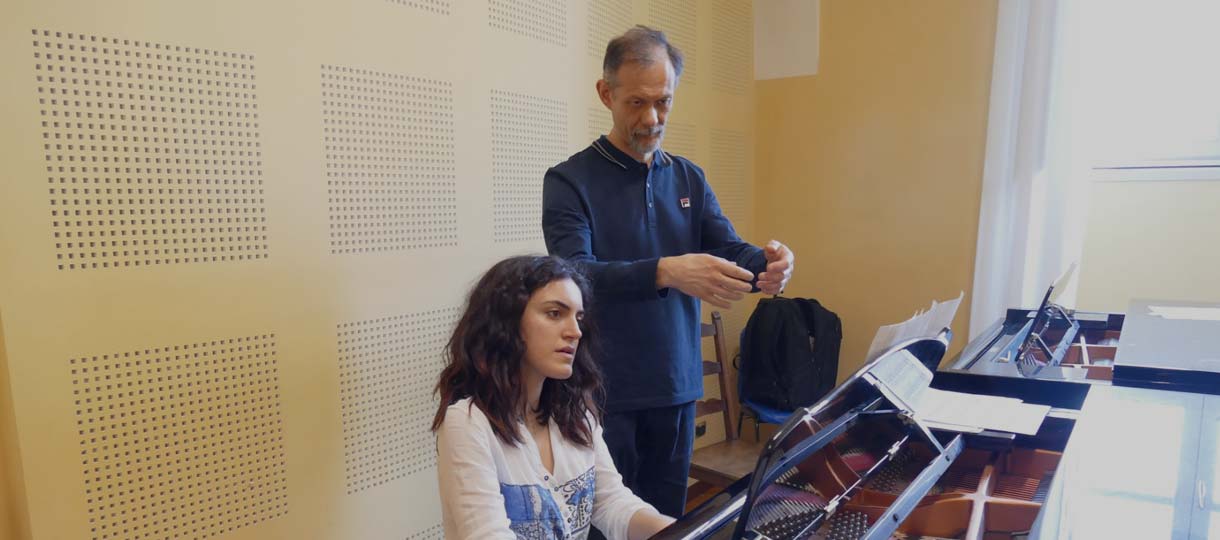Enrico Pace is an acclaimed pianist who performs regularly on international stages and has played with many prestigious orchestra, including the Royal Concertgebouw Orchestra of Amsterdam, Munich Philharmonic Orchestra, London Symphony Orchestra, BBC Orchestra and the National Orchestra of Santa Cecilia in Rome. He has performed with many eminent conductors, notably Roberto Benzi, Gianandrea Noseda and Zoltan Kocsis. As well as solo performances, he frequently performs in chamber music ensembles. He is part of a permanent piano duo with Igor Roma and plays regularly in recitals with violinist Leonidas Kavakos. He teaches piano at the Accademia of Imola.
At the Accademia di Musica, Enrico Pace teaches advanced courses in piano and held masterclasses at our Musica d’Estate summer campus in Bardonecchia. He is one of the teachers in our new Postgraduate Specialist Courses in Music Performance. As part of our section A Career in Music, we interviewed him to ask what advice he would give to our students, who are set to become the future generation of music professionals.
What were the key experiences that marked your development and training as a musician? At what time of your life did they take place? Why were they significant?
I would say that the first thing for me was discovering the records that my parents listened to, which got me interested in music. I still remember how thrilled I was when I found an LP of Liszt concertos in a shop: I was so excited to listen to them. I was encouraged to follow this interest and I soon began to have piano lessons. One fundamental experience was studying with Maestro Franco Scala at the Conservatory of Pesaro, because it gave me the skills to envision music as the central activity of my life. I continued my studies at the Accademia of Imola, where I came into contact with great pianists like Lazar Berman and many others, and this opened my mind up to the infinity of ways to approach the keyboard and interpretation. At that time (the 1980’s) there was no Youtube and, apart from records and the radio, it was a rare and valuable experience to come into contact with other ways of playing music. Studying Composition and Conducting was another very important part of my training as a musician.
Can you describe one or two turning points in your career? What impact did they have on your career? Why were they important?
Undoubtedly, the Liszt Competition in Utrecht in 1989 was a fundamental stimulus to my career as a performer. But I gradually understood that everything I had learnt up to that moment was only the first stage on a path that would enable me to learn more and more about the dynamics of performing music. Essential to this learning process was the experience I gained as a concert pianist and the support from a great musician, J.De Tiège, a Belgian teacher who very generously followed me from hall to hall, listening to many of my performances and offering me valuable advice. The principal goal was to develop the capacity to listen to myself (often by recording from the back of the concert hall), in order to correct many basic elements (pace, phrasing, sound dynamics, tone colours, pedalling) and to learn the importance of the relationship between the music and the space in which the sound was projected (a theory similar to that of S. Celibidache, another great model for me in those years). Another experience that contributed immensely to my growth as a musician was playing chamber music with great string players, like F. P. Zimmermann and L. Kavakos, with whom I found myself dealing with a different repertoire and style of phrasing, which was closer to human body awareness and breathing. This enabled me to learn a great deal about how to interpret a phrase together, how to accompany a melody, and also pushed me to find original solutions in timbre in order to overcome the sound limitations of the piano.

Often our mistakes teach us important lessons. If you could go back in time in your career what would you do differently?
I would be more patient, be less judgemental and would try to be better at estimating the time necessary to achieve my goals in interpreting a new piece of music. When I was young I was much more superficial when it came to practising and studying pieces in depth. Now I am much more aware that everything is part of a mosaic made up of pieces of musical knowledge, which very gradually takes form and needs years to be fully absorbed by the musician.
Along a musician’s career path there are always many important decisions to be made and these often depend on and result from the opportunities that are offered to them. What helped you to stay focused and not to lose sight of your goals?
Certainly, I have been very lucky in my decisions, even the impulsive ones, like when I entered the Liszt Competition in 1989. My teacher (Scala)was against it because I hadn’t realized how much work I was committing to until very late (only 5 or 6 months before the competition, I think) and several of the pieces required were not yet in my repertoire. Today, if one of my students wanted to do something similar, I would warn them to be very careful: only time can consolidate a piece that you perform for the first time and I absolutely do not advise experimenting in situations where you are under great pressure. But then, as I was much more impulsive, I went to Utrecht. Thanks also to the fact that there weren’t many people entered (it was only the second year), I was lucky enough to go through to the finals, even though my playing was less than perfect, and there I found a very generous panel of judges! In general, you really need to develop a precise sense of your actual capacities, especially with regard to the type of repertoire you play, and to follow a path that is compatible with your own musical inclinations One ever present danger lies in accepting too many commitments, with the result that you are unable to maintain a consistent level of performance.
Apart from studying with great passion and dedication, what advice would you give to young musicians who are starting out on a career in music?
Today, the development of so many kinds of communication and media technology means that there are many channels outside the old systems thst musicians can use to make themselves known. So if a student wants to explore these media opportunities, I encourage them: we mustn’t be prejudiced against any tool that will help you attract an audience. But at the heart of it all there must be your passion for music and the fact that you love what you do, because that’s what will always shine through and that’s what will enable you to realize your ambitions. In addition, your vision of a particular piece should be the result of constant effort to expand your aesthetic awareness as far as possible: curiosity about all forms of art, literature and science is fundamental if you wish to give a personal stamp to your interpretation. I always urge my students not to be discouraged by failures, which we have all met with along our path. Ultimately, they serve to make us stronger in the face of adversity, always a part of life: for example, living through the present very difficult time without being overwhelmed by depression. Instead of agonizing about the opportunities that you are missing out on, I would advise you to take advantage of this period of immobility to study new pieces and get ready for what will come after lockdown. Because an “after Covid” will come and there will still be the need to share the emotions communicated through music. Therefore, you should set up long term projects for yourself, so that when the time comes to emerge from this period of stasis you’ll be in top form and ready to go into full activity. To all young musicians walking the path of musical knowledge I send my very best wishes: good luck to you all!!
__________________
